Eat Your Way To Fertility With These Delicious Foods
Experts in the field have long recognized the connection between diet and fertility. It is well-known that a balanced diet plays a crucial role in overall health, but it also significantly impacts fertility. Our foods provide the necessary nutrients for our bodies to function correctly, including reproductive health. Learn about the top 6 foods that can boost fertility.
A balanced diet is essential for fertility because it provides the body with the necessary nutrients to support reproductive health. When our bodies lack certain nutrients, it can lead to hormonal imbalances, irregular menstrual cycles, and decreased fertility. On the other hand, a diet that is rich in nutrients can help regulate hormones, improve egg quality, and boost the possibility of conception.
Getting enough vitamins and minerals is particularly important for fertility. Specific vitamins and minerals, such as iron, folate, and zinc, play a crucial role in reproductive health. Folate is essential for developing a healthy fetus and can help prevent congenital disabilities. Iron is requisite to produce healthy red blood cells for carrying oxygen to the reproductive organs. Zinc is involved in hormone production and can help regulate menstrual cycles.
Maintaining a healthy BMI is also crucial for fertility. Being overweight or underweight can interfere with hormonal balance and disrupt ovulation. Women with low BMIs may have irregular menstrual cycles or not ovulate. On the other hand, women who are overweight may have higher levels of estrogen, which can interfere with ovulation. Achieving and maintaining an optimal weight through a balanced diet can help improve fertility.
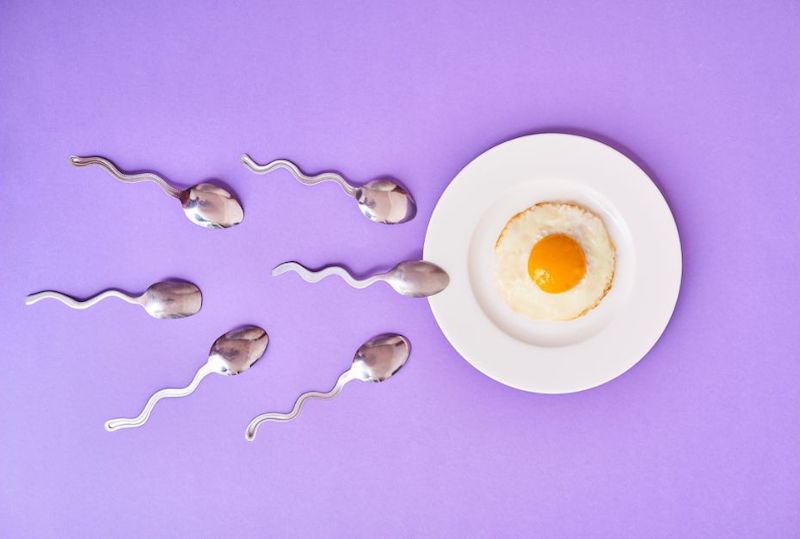
Top 6 Foods for Boosting Fertility
Now that we understand the importance of a balanced diet for fertility let's explore the top 10 foods that can boost fertility. These foods are nutrient-dense and can help improve overall health, enhancing fertility.
- Leafy Greens: Kale, spinach, and Swiss chard contain essential vitamins and minerals for fertility. They are rich in folate, iron, and calcium, all important for reproductive health. Leafy greens also contain antioxidants that can help shield the eggs and sperm from damage.
- Berries: Strawberries, blueberries, and raspberries are delicious and plentiful for fertility. They are rich in antioxidants, particularly vitamins C and E, which can help improve egg quality and sperm health. Berries also deliver fiber, which can help regulate blood sugar levels and promote hormonal balance.
- Seeds and Nuts: Seeds and Nuts are a nutrient-dense addition to your diet and can provide a wide range of benefits for fertility. They are rich in good fats, fiber, and protein, which can help regulate hormones and promote ovulation. Nuts and seeds also contain antioxidants and other nutrients that can improve egg quality and sperm health.
- Whole Grains: Quinoa, brown rice, and oats contain complex carbohydrates, which work to regulate blood sugar levels and promote hormonal balance. They are also rich in vitamins, minerals, and fiber, necessary for reproductive health. Whole grains can help improve egg quality and increase the chances of conception.
- Protein: Protein is essential for fertility because it provides the building blocks for hormones and reproductive tissues. Lean proteins such as fish, tofu, and chicken benefit fertility. They are low in saturated fat and high in essential amino acids that can support reproductive health.
- Healthy Fats: Healthy fats such as avocados, fatty fish, and olive oil are important for fertility because they help regulate hormones and promote ovulation. They are saturated in omega-3 fatty acids, which can improve egg quality and sperm health.
Leafy Greens: A Fertility Powerhouse Food
Leafy greens are a fertility powerhouse because they contain essential nutrients that can improve reproductive health. They are rich in folate, vital for developing a healthy fetus and preventing congenital disabilities. Leafy greens are also a great source of iron necessary to produce healthy red blood cells. Iron deficiency can lead to anemia, interfering with ovulation and fertility.
In addition to folate and iron, leafy greens are also rich in calcium, which is good for reproductive health. Calcium is a vital part of muscle function, including the uterus muscles. It can help regulate menstrual cycles and promote regular ovulation. Leafy greens also contain antioxidants such as vitamins E and C, which can help shield the eggs and sperm from damage.
Including leafy greens in your diet is easy and can be done in various ways. You can add them to salads, stir-fries, smoothies, or even make them the star of a dish. Spinach, kale, Swiss chard, and collard greens are all excellent choices.
The Benefits of Berries for Fertility
Berries are not only delicious but also beneficial to fertility. They are rich in antioxidants, vitamins C and E, and minerals, which can help improve egg quality and sperm health. Antioxidants help protect the eggs and sperm from impairment caused by environmental toxins and free radicals, which can lead to DNA damage and decrease fertility. Chronic inflammation in the body can negatively impact fertility. Berries contain anti-inflammatory compounds that can help reduce inflammation and promote a healthy reproductive system. Berries contain essential nutrients like folate, which is crucial for preventing neural tube defects in early pregnancy.
Berries contain phytoestrogens, which are plant compounds that mimic the effects of estrogen in the body. These compounds can help regulate hormonal balance.
In addition to these benefits, berries are also a great source of fiber. Fiber benefits fertility because it can help regulate blood sugar levels and promote hormonal balance. High blood sugar levels can interfere with ovulation and decrease fertility.
Berries have a low glycemic index, meaning they do not cause a rapid increase in blood sugar levels. Stable blood sugar is essential for maintaining hormonal balance and supporting fertility.
Seeds and Nuts: A Nutrient-Dense Fertility Boosting Food
Nuts and seeds are a nutrient-dense addition to your diet and can offer a wide range of benefits for fertility. They acquire healthy fats, protein, and fiber, which can help regulate hormones and promote ovulation. Nuts and seeds also contain antioxidants and other nutrients that can improve egg quality and sperm health.
Healthy fats are essential for fertility because they help regulate hormones and promote ovulation. Nuts and seeds include omega-3 fatty acids, making them a great source of healthy fats. Omega-3 fatty acids benefit reproductive health and can improve egg quality and sperm health.
In addition to healthy fats, seeds, and nuts are also a great source of protein. Protein is essential for fertility because it provides the building blocks for hormones and reproductive tissues.
Seeds and nuts can be enjoyed as a snack or added to meals. Walnuts, almonds, chia seeds, and flaxseeds are all excellent choices. Aim to include a handful of nuts or seeds in your diet every day to boost your fertility.
The Role of Whole Grains in Fertility
Whole grains are an important part of a balanced diet and can be crucial to fertility. They are a great source of complex carbohydrates, which can help balance blood sugar and promote hormonal balance. Whole grains are also rich in fiber, vitamins, and minerals necessary for reproductive health.
Complex carbohydrates are particularly beneficial for fertility because they digest slowly, which helps regulate blood sugar levels. High blood sugar levels can interfere with ovulation and decrease fertility. Including whole grains in your diet can help regulate blood sugar levels and increase the chances of conception.
The Power of Protein for Fertility
Protein is essential for fertility because it provides the building blocks for hormones and reproductive tissues. It produces eggs and sperm and plays a crucial role in reproductive health.
Lean proteins such as tofu, chicken, and fish benefit fertility. They are low in saturated fat and high in essential amino acids that can support reproductive health.
In addition to lean protein sources, dairy products such as whole milk, whole yogurt, and cheese are also excellent protein sources. They are rich in calcium crucial in muscle function, including the uterus muscles. It can help regulate menstrual cycles and promote regular ovulation.
You can add chicken or fish to salads, stir-fries, or soups. Tofu is excellent as a meat substitute in a variety of dishes. You may consume dairy products alone or as ingredients in recipes.
The Benefits of Healthy Fats for Fertility
Healthy fats help regulate hormones and promote ovulation. They produce hormones and play a crucial role in reproductive health. Avocados, fatty fish, and olive oil are all exceptional sources of healthy fats. Avocados contain monounsaturated fats, which can help regulate hormones and promote ovulation. Olive oil also contains monounsaturated fats and can help reduce inflammation. Fatty fish such as mackerel, salmon, and sardines all contain omega-3 fatty acids, which can improve egg quality and sperm health.
You can utilize olive or avocado oil as a salad dressing or a toast spread. Fatty fish can be grilled, baked, broiled, and served with vegetables.
Oysters are often considered an aphrodisiac and can boost fertility for several reasons. Oysters are one of the best sources of zinc, a mineral crucial to reproductive health. Zinc is essential for male testosterone production and helps regulate female hormone levels, promoting healthy ovulation.
Oysters contain high levels of amino acids, including D-aspartic acid and N-methyl-D-aspartate (NMDA), linked to increased male testosterone production. Higher testosterone levels can enhance sperm production and motility.
Oysters are an outstanding source of omega-3 fatty acids, associated with improved fertility in both men and women. Omega-3s help regulate hormone levels, reduce inflammation, and promote healthy reproductive function. They also contain various antioxidants like vitamin E, selenium, and zinc, which help protect reproductive cells from oxidative damage caused by free radicals. This protection can improve sperm quality and egg health.
Oysters contain high dopamine levels, a neurotransmitter associated with pleasure and arousal. Increased dopamine levels can enhance sexual desire and improve overall sexual function.
Consuming Foods To Boost Fertility
It's important to note that while the foods described in this list may have potential benefits for fertility, they should not be relied upon as the sole solution for fertility issues. Maintaining a healthy diet, regular exercise, managing stress levels, and seeking medical advice are crucial for optimizing fertility.
- Protecting Your Health: Choosing A Sperm Bank Over Natural Insemination
- Hatching a Plan: Learning The Basics About Assisted Hatching in IVF
- Navigating GYN Surgery Before Artificial Insemination
- PGT Testing and Its Role in IVF Treatment
- The Ultimate Guide To Where You Can Donate Sperm In All 50 States
Learn All About Christie Murphy's IUI Pregnancy Journey In This Exclusive Cryobank America Interview
When Christie Murphy and Jamie crossed paths ten years ago, little did they know that their encounter would lead to an extraordinary lifelong journey. During the aftermath of the 2020 pandemic, a mutual friend played matchmaker, sensing the potential for a deep connection between the two. And oh, how right they were!
Reflecting on that magical moment, Christie Murphy reminisces, "As cliché as it may sound, it was truly love at first sight"!

Christie Murphy with her wife, Jamie.
June 15, 2021: christie.murph wrote, "Impossible not to smile witchuuu 🧀"
Magic Beneath The Eiffel Tower: Christie Murphy Says, "I Do"
From that moment on, their lives became intertwined, inseparable in their new romance. In August of 2021, Jamie decided to take their relationship to new heights. In a picturesque outdoor setting adorned with vibrant flowers beneath the iconic Eiffel Tower, Jamie got down on one knee and proposed to Christie. Joy and excitement flooded social media as friends and family shared congratulations and well wishes for their bright future together.

Jamie proposed to Christie in Paris in August 2021
August 23, 2021: christie.murph wrote, "Haven’t yet woken up from this dream. Engaged to the LOVE OF MY LIFE in Paris! 💍"

Christie Murphy and Jamie are officially engaged.
February 14, 2022: christie.murph wrote, "Never in my WILDEST dreams did I think I’d find someone half as perfect as you; my delicious chocolate truffle 💝 #Valentine"
The Big Day
April 2022 marked a new chapter in Christie and Jamie's love story. On a sandy beach surrounded by lush palm trees, they exchanged vows in front of loved ones. Christie and Jamie looked radiant in their stunning white wedding gowns, perfectly complementing the serene backdrop.

Sharing her thoughts on marriage, Christie took to Instagram to express her gratitude:
"I still can't believe I was a BRIDE! Honestly, I never envisioned myself as a bride growing up; NEVER. Most little girls dream about it, plan their fantasy wedding, picture their dream dress, and spend hours and days daydreaming about their 'someday.' Me? NEVER. I'm unsure if it was because I never pictured myself marrying a man, or maybe I couldn't picture myself in the big white dress. Maybe I didn't find myself worthy of being a bride like I didn't feel girly enough."
Christie Murphy
"It's unbelievable, though; one day, out of nowhere, once I had grown up (and I mean grown up, into a confident, enlightened, and secure woman), I felt this sudden urge to get married and BE that bride I was once so emotionally detached from. I'm unsure if it's because I met "the one" or because I finally felt comfortable and safe enough to get married. All I know is that once I felt it, I couldn't reverse it. I pictured my dress, my flowers, my hair, my veil, my bride-to-be, her dress, her smile, ALL OF IT."

Christie Murphy On Family Planning
When we sat down with Christie and Jamie to discuss their decision to have children, their perspectives on parenthood were intriguingly different. Christie admitted that she never thought she needed to be a mother, but she was open to the idea. She explained, "I never really had that 'pull' to be a mom. I only started craving a baby after falling in love with Jamie." On the other hand, Jamie had always known that she wanted to have kids, a dream she had cherished since childhood.

Six months before the couple married, Christie and Jamie held Modern Fertility's TTC bundle with their fur babies.
October 6, 2021 christie.murph wrote, "Yes, we have our fur-babies, but Jamie & I talk about having REAL babies constantly! We’re getting married in 6 months, so we’ve already started prepping for our fertility journey with @modernfertility 🤰🏼💞🤰🏼"
Christie Murphy and her Wife, Jamie, Begin Their Donor Search
Not wasting any time, Christie and Jamie embarked on a search for the perfect sperm donor. Their quest took them across the country as they meticulously sifted through hundreds of donor profiles. In an exclusive interview, Christie shared their journey with us.
"We had specific criteria in mind, " Christie explained. "We wanted someone tall and European, with light eyes, because Jamie and I have light eyes. Resembling our families was important to us. We hoped for an athletic donor since Jamie played soccer her whole life, and I wanted him to be a brainiac."
"Finding him couldn't have been possible without Cryobank America," she said gratefully.
"Their professionalism, compassion, and unwavering support made the process smooth and stress-free. They were always there for us whenever we needed assistance, and I can't say enough great things about them".
September 21, 2022
Christie Murphy shares how she and her wife, Jamie, found their perfect donor.
After browsing through countless profiles, Christie and Jamie stumbled upon a donor who seemed tailor-made for them. A biomedical engineer with a passion for soccer and volleyball, he possessed all the qualities they sought. Cryobank America provided an audio recording, additional photos, and a handwritten letter, which allowed the couple to delve deeper into his life story, fostering an emotional connection that solidified their decision.
Christie and Jamie's IUI Pregnancy Journey Begins!
Christie and Jamie purchased Premium IUI vials, which acquire the highest concentration of motile sperm cells per milliliter. They purchased enough vials to try insemination multiple times while having the option to store extra vials for future siblings. To increase their chances of success, Christie diligently tracked her ovulation cycle using over-the-counter ovulation tests, such as Clear Blue Advanced Digital and Modern Fertility's TTC Bundle from Amazon, which detects a rise in luteinizing hormone (LH) in the urine. She gained a true sense of her peak fertile days by utilizing these resources for a few consecutive cycles.
When asked if she has any fertility tips, Christie enthusiastically shared her belief in the power of sea moss gel.
"I swear I always say sea moss got me pregnant! I took sea moss gel daily for a few weeks before we conceived. I continued to take it throughout the entire process, and I'm convinced it helped"!
Home Insemination vs. In-Clinic IUI Procedure
Christie and Jamie opted for an intimate experience in their own home using one of Cryobank America's at-home insemination kits for their first insemination attempt. However, after not achieving pregnancy on their second try, they decided it would be best to have their OB-GYN perform intrauterine insemination (IUI) within his clinic to avoid wasting any vials.
Although not mandatory, Christie's OBGYN suggested taking a follicle-stimulating hormone to maximize the chances of timely and successful ovulation. While there was a slightly increased chance of conceiving multiples, Christie trusted her OB-GYN's recommendation and decided to proceed with this fertility-boosting option. She experienced no side effects from the medication but produced three follicles that cycle and ovulated all three eggs.
Reflecting on their IUI experience, Christie emphasized the importance of trust in your fertility specialist or OB-GYN.
"I think a big factor was trusting our doctor and having a good relationship with his entire team. Our doctor even let Jamie assist him in the procedure, and we were so grateful for this!"
Overall, their IUI journey was seamless, thanks to the strong relationship they had built with their medical team.
Christie Murphy's IUI Success: Christie and Jamie Share Their Pregnancy With Family
When asked about their reaction upon seeing a positive pregnancy test, Christie couldn't contain her excitement.
"We were extremely excited and even slightly shocked because we took our test prematurely, at only nine days past ovulation! The pregnancy test looked like a strong BFN (big fat negative) until a few minutes later! We thought our eyes were deceiving themselves because it seemed almost too good to be true! We sobbed tears of joy. Sure enough, those test indicators grew darker each day!"

Christie Murphy shares her wonderful miracle.
September 12, 2023: christie.murph wrote, "I don’t think I’ll ever get over what’s going on inside my body; Miracles ✨"
The couple decided to wait until they heard a heartbeat to share the news with their immediate family. They finally revealed that they were expecting a baby at around six weeks. Little did their loved ones know, they were in for an even bigger surprise.
Christie and Jamie's Gender Reveal: Plot Twist!
On August 31, 2023, the newlyweds revealed that they wouldn't expect one baby but are expecting two bundles of joy! One by one, Christie and Jamie blasted their gender reveal cannons. Both cannons were pink, indicating Christie was carrying two twin girls!

Christie and Jamie documented their gender reveal party on Instagram, sharing pictures and videos that captured this highly anticipated moment.
September 2, 2023: christie.murph wrote, "“THE REVEAL” - aka the day we shocked our entire family 🥹"
Donor Conception
In the cryobank community, one topic that often arises is determining the best approach to discussing donor conception with your donor-conceived child. It can be a sensitive subject for some, but Christie and Jamie are open to sharing their thoughts on discussing this with their twin girls someday.
"We don't have a concrete plan for communicating with our girls about donor conception yet," Christie says. "But one thing is for sure - we won't hide anything from them or keep any secrets. We believe in full transparency and honesty."
Christie and Jamie plan on waiting until their girls are old enough to fully understand the concept of donor conception before sharing the specific details and logistics. They want to ensure their daughters have the maturity and understanding to process this information.
"We won't tell them that the stork delivered them to our doorstep," Christie adds. "But we will save the specific details for when they are a bit older and can fully comprehend how they were conceived."
We Asked Christie If There Were Anything She Would Change
When asked if there were anything they would do differently throughout their pregnancy journey, Christie reflected on their decision to try conceiving at home.
"Honestly, we wouldn't do anything differently. We do wish we didn't waste vials through at-home insemination. While it was a memorable experience filled with privacy and intimacy, we now realize we had a greater chance for success with professional assistance."
Ultimately, every couple's pregnancy journey is unique, and what works for one may not work for another. It is essential to approach the process with an open mind, realistic expectations, and a willingness to seek professional help.

Christie and Jamie hold ultrasound photos of their twin girls.
August 31, 2023: christie.murph wrote, "Marrying one another was the easiest decision we ever made; choosing to start a family was even EASIER. So much MORE love - COMING 2024 🍼"
Christie Murphy Shares Words Of Encouragement
With unwavering determination, Christie offers words of encouragement to those wishing to conceive through donor insemination. She emphasizes the uniqueness and specialness of each individual's journey towards motherhood.
"If you are someone who is trying to conceive using a sperm donor, just know that your journey to becoming a mom is so unique and so special! What is meant to happen will happen! Having trust in the journey is key! Remember to have patience, try to rely on your support system when needed, and have faith that every step of this journey will be worth it and offer so much more than you could ever imagine!"
Christie Murphy
Cryobank America Gives Special Thanks To Christie and Jamie!
Christie and Jamie's story is a testament to the power of honesty, trust, and community in navigating the path to donor conception. Their openness and willingness to share their experiences provide comfort and guidance for others embarking on this life-changing adventure. As the cryobank community grows, stories like Christie's and Jamie's remind us of the beauty and strength of embracing all unique paths to parenthood. Cryobank America feels privileged to have been part of their conception journey!
- Protecting Your Health: Choosing A Sperm Bank Over Natural Insemination
- Hatching a Plan: Learning The Basics About Assisted Hatching in IVF
- Navigating GYN Surgery Before Artificial Insemination
- PGT Testing and Its Role in IVF Treatment
- The Ultimate Guide To Where You Can Donate Sperm In All 50 States
Testosterone replacement therapy (TRT) has become increasingly popular in recent years, with more and more men seeking treatment for low testosterone levels. While TRT can provide numerous benefits, it can negatively impact male reproductive health. Maintaining healthy sperm count and quality is crucial for male fertility, and TRT can potentially affect these factors. Therefore, exploring the relationship between TRT and male reproductive health is essential to ensure that men are well-informed about this treatment's potential risks and benefits.
TRT and its Effects on Male Reproductive Health
TRT (testosterone replacement therapy) is a hormone treatment involving testosterone administration to men with low levels of this hormone. Testosterone is a vital hormone for male development and reproductive function. It plays a role in the growth and development of secondary sexual characteristics, such as muscle mass and facial hair, as well as in the production of sperm. TRT can treat conditions such as hypogonadism, where the body does not produce enough testosterone, or alleviate symptoms of low testosterone levels, such as fatigue and decreased libido.
While TRT can provide numerous benefits, there are potential effects on male reproductive health. Testosterone affects sperm production and quality, so any testosterone level changes can impact fertility.

Understanding Sperm Count and Quality: What You Need to Know
The number of sperm cells determines the sperm count present in a given sample of semen. Sperm quality, on the other hand, refers to the health and viability of the sperm cells. Both sperm count and quality are essential factors in male fertility. A higher sperm count increases the chances of fertilization, while healthy sperm cells are more likely to fertilize an egg successfully.
Several factors can affect sperm count and quality. These include age, lifestyle factors such as smoking and excessive alcohol consumption, certain medical conditions, and exposure to environmental toxins. Men must maintain a healthy lifestyle and minimize exposure to harmful substances to optimize their sperm count and quality.
How TRT Affects Sperm Count and Quality
Several studies have explored the impact of TRT on sperm count and quality. While some studies have found no significant changes in these parameters, others have reported decreased sperm count and quality in men undergoing TRT. The exact mechanisms behind these changes are not fully understood, but some scientists reveal that the exogenous testosterone introduced through TRT can suppress the body's natural production of testosterone, leading to a decrease in sperm production.
It is important to note that not all men will experience a decrease in sperm count and quality while undergoing TRT. Factors such as the dosage and duration of TRT and individual variations in response to treatment can influence the impact on sperm parameters. Additionally, some studies have found that discontinuing TRT can lead to a recovery of sperm count and quality, suggesting that the effects may be reversible.
The Role of Testosterone in Male Fertility
Testosterone plays a crucial role in male fertility. It is responsible for the development and maturation of sperm cells in the testes. Low testosterone levels can result in decreased sperm production and poor sperm quality, negatively impacting fertility.
Balancing testosterone levels maintains male fertility health. While low testosterone levels can harm fertility, excessively high levels can also have adverse effects. Therefore, finding the right balance to optimize reproductive health is essential.
TRT and Its Impact on Testicular Function
TRT can potentially affect testicular function, which can affect male reproductive health. The testes produce testosterone, and receiving exogenous testosterone through TRT can suppress the body's natural production. This suppression can lead to testicular atrophy or shrinkage of the testes, which can impact sperm production.
Men undergoing TRT should monitor testicular function to detect and manage potential adverse effects. Regular check-ups and hormone level monitoring can help identify changes in testicular function and allow for appropriate adjustments to the treatment plan.
The Relationship Between TRT and Semen Parameters
Several studies have explored the relationship between TRT and semen parameters, such as sperm concentration, semen volume, and motility. While some studies have found no significant changes in these parameters, others have reported a decrease in sperm concentration and semen volume, as well as a reduction in sperm motility, in men undergoing TRT.
The impact of TRT on semen parameters can vary depending on factors such as dosage and duration of treatment, as well as the baseline levels of testosterone and semen parameters. Men undergoing TRT need regular semen analysis to monitor any changes in these parameters and adjust their treatment plan appropriately if necessary.
TRT and Sperm DNA Integrity: What You Need to Know
Sperm DNA integrity refers to the health and stability of the genetic material within sperm cells. Damaged DNA can lead to infertility or an increased risk of congenital abnormalities in offspring.
Some studies have suggested that TRT may harm sperm DNA integrity. The precise workings of this phenomenon remain largely elusive, but some scientists have found that introducing exogenous testosterone through TRT can disrupt the delicate balance of hormones and enzymes involved in DNA repair processes within sperm cells.
Monitoring sperm DNA integrity in men undergoing TRT is critical to detect and manage potential adverse effects. Regular semen analysis can help assess sperm DNA integrity and guide treatment decisions.
The Effect of TRT on Male Infertility: What the Research Says
Several studies have explored the impact of TRT on male infertility. While some studies have found no significant changes in fertility parameters, others have reported a decrease in sperm count, motility, and morphology and an increase in DNA damage in men undergoing TRT.
It is important to note that not all men undergoing TRT will experience infertility. Factors such as treatment duration, dosage, and individual variations in treatment response can influence fertility's impact. Additionally, some studies have found that discontinuing TRT can lead to a recovery of fertility parameters, suggesting that the effects may be reversible.
Managing Male Infertility in TRT Patients
Men undergoing TRT concerned about potential impacts on fertility can implement strategies to manage male infertility. These strategies include adjusting the dosage and duration of TRT and incorporating other treatments, such as fertility medications or assisted reproductive techniques.
Men undergoing TRT must work closely with a healthcare provider specializing in male reproductive health to monitor and manage potential fertility issues. Regular check-ups and semen analysis can help assess fertility parameters and guide treatment decisions.
- Protecting Your Health: Choosing A Sperm Bank Over Natural Insemination
- Hatching a Plan: Learning The Basics About Assisted Hatching in IVF
- Navigating GYN Surgery Before Artificial Insemination
- PGT Testing and Its Role in IVF Treatment
- The Ultimate Guide To Where You Can Donate Sperm In All 50 States
Fertility Testing For Men and Women
Fertility assessments are medical evaluations to determine an individual's ability to conceive a child. These assessments are for both men and women, providing valuable information about their reproductive health and potential fertility issues. By undergoing fertility assessments, individuals can gain insight into their reproductive capabilities and make informed decisions about family planning.
For men, fertility assessments primarily focus on sperm count and quality. The number of sperm cells determines the sperm count in a semen sample. A low sperm count can significantly reduce the chances of conception. On the other hand, women undergo fertility assessments to evaluate their ovarian reserve, which measures the quantity and quality of their eggs. These assessments help identify potential fertility issues and guide individuals toward appropriate treatment options.
Understanding Sperm Count and Male Fertility
A healthy sperm count is around 15 million sperm per milliliter of semen. However, a higher sperm count does not guarantee fertility. Other factors, such as morphology and sperm motility, also play a role.
Several factors can affect sperm count, including lifestyle choices, medical conditions, and genetic factors. Lifestyle considerations such as smoking, excessive alcohol consumption, drug use, and obesity can all harm sperm count. Exposure to many environmental toxins, such as chemicals and pesticides, can also affect male fertility.
Specialists can execute many tests to assess male fertility. These tests include semen analysis, which evaluates the quantity, quality, and motility of sperm in a semen sample. Other tests may include hormone level testing, genetic testing, and imaging studies to evaluate the reproductive organs.

Understanding the Numbers and Parameters of A Semen Analysis
Semen analysis measures several parameters that provide valuable information about sperm quality and quantity. These parameters include:
- Volume: Volume is the amount of semen produced during ejaculation. The normal range is typically between 1.5 to 5 milliliters.
- Concentration: This measures the number of sperm present in each milliliter of semen. An average concentration is usually greater than 15 million sperm per milliliter.
- Motility: This assesses the ability of sperm to move and swim towards the egg. The World Health Organization (WHO) defines normal motility as at least 40% of sperm exhibiting progressive movement.
- Morphology: This evaluates the shape and structure of sperm. Normal morphology means at least 4% of sperm have a regular form.
- pH: This measures the acidity or alkalinity of semen. The normal pH range is usually between 7.2 to 8.0.
Understanding these parameters and their expected values is essential in interpreting semen analysis results. Abnormal results in these parameters may indicate potential fertility issues or underlying health conditions.
Factors Affecting Male Fertility
In addition to sperm count, several lifestyle and medical factors can affect male fertility. Lifestyle considerations such as smoking, excessive alcohol consumption, drug use, and obesity can negatively impact sperm count and quality. Smoking, for example, has been shown to decrease sperm count and motility, while obesity can lead to hormonal imbalances that affect sperm production.
Medical conditions can also affect male fertility. Conditions such as Varicocele, the enlargement of veins within the scrotum, can lead to decreased sperm production. Additionally, hormonal imbalances, infections, and certain medications can impact male fertility.
Female Fertility
Female fertility refers to a woman's ability to conceive and carry a pregnancy to term. Various factors, including age, hormonal balance, and the health of the reproductive organs, influence it. Understanding female fertility is crucial for women planning to start a family or experiencing difficulties conceiving.
Several factors can affect female fertility. Age is one of the most significant factors, as a woman's fertility declines with age. As women age, the quality and number of their eggs decrease, making it more challenging to conceive. Hormonal imbalances, such as PCOS (polycystic ovary syndrome) or thyroid disorders, can also affect female fertility. Additionally, structural abnormalities in the reproductive organs, such as blocked fallopian tubes, can hinder conception. Uterine fibroids can also prevent conception if left untreated.
Testing and Evaluations
Medical tests and evaluations may include blood tests to check hormone levels, ultrasounds to evaluate the woman's ovarian reserve and uterine health, and semen analysis to assess the quality and quantity of sperm. These tests will help the fertility specialist determine the most appropriate treatment plan for the couple.
Ovarian Reserve and Its Importance
Ovarian reserve is determined by the quality and quantity of a woman's eggs. It indicates female fertility as it determines the likelihood of successful conception. A woman's ovarian reserve naturally declines with age, and a low ovarian reserve can make it more difficult to conceive.
Assessing ovarian reserve is crucial for women planning to start a family or experiencing difficulties conceiving. Several tests can evaluate ovarian reserve, including blood tests that measure hormone levels, such as follicle-stimulating hormone (FSH) and anti-Mullerian hormone (AMH), or ultrasounds, such as AFC examinations. These tests provide valuable information about a woman's egg quantity and quality, helping to guide fertility treatment options.
AMH testing measures the level of AMH hormone in the blood. Cells in the ovarian follicles generate this hormone, which contains the eggs. A higher AMH level indicates a more significant number of eggs remaining in the ovaries, while a lower level suggests a diminished ovarian reserve.
FSH testing measures the level of FSH hormone in the blood. FSH stimulates the development and growth of follicles in the ovaries. A higher FSH level indicates that the ovaries are not responding appropriately to FSH stimulation, which may suggest a diminished ovarian reserve.
AFC testing involves an ultrasound examination to count the number of small follicles in the ovaries. These small follicles represent potential egg release during ovulation. A higher AFC suggests a more significant number of eggs remaining in the ovaries, while a lower count may indicate a diminished ovarian reserve.
Understanding ovarian reserve can help women make informed decisions about family planning. Suppose a woman has a low ovarian reserve. In that case, she may choose to pursue fertility resources, such as in vitro fertilization (IVF), or consider options like egg freezing to preserve her fertility for the future.

Age and Female Fertility
Age is a significant factor that affects female fertility. As women age, their fertility declines due to a decrease in the number and quality of their eggs. This decline in fertility typically begins in the late 20s and becomes more pronounced after age 35.
As women age, the number of eggs in their ovaries decreases, and the remaining eggs may have a higher chance of chromosomal abnormalities. Conceiving at an older age can increase the risk of miscarriage and congenital disabilities. Since the quality of the eggs decreases with age, it becomes more difficult for fertilization to occur.
Various tests can assess female fertility. These tests may include blood tests to evaluate hormone levels, imaging studies to assess the reproductive organs, and monitoring the menstrual cycle to determine ovulation. These tests provide valuable information about a woman's reproductive health and can help guide fertility treatment options if needed.
Treatment Options for Infertility
There are various treatment options available for both male and female infertility. The best treatment plan will depend on the underlying cause of infertility and the individual's circumstances.
For male infertility, treatment options may include lifestyle changes. Medications can also treat underlying medical conditions or hormonal imbalances. In some cases, surgical interventions may be necessary to correct structural abnormalities or blockages in the reproductive organs.
For female infertility, treatment options may include lifestyle modifications such as maintaining a healthy weight, managing stress, and avoiding excessive alcohol consumption. Medications can also regulate hormonal imbalances or stimulate ovulation. Technologies in assisted reproduction, such as IVF (in vitro fertilization), can help women with more complex fertility issues.
- Protecting Your Health: Choosing A Sperm Bank Over Natural Insemination
- Hatching a Plan: Learning The Basics About Assisted Hatching in IVF
- Navigating GYN Surgery Before Artificial Insemination
- PGT Testing and Its Role in IVF Treatment
- The Ultimate Guide To Where You Can Donate Sperm In All 50 States
What is ICSI and How Does it Work?
ICSI, or intracytoplasmic sperm injection, is a fertility treatment that involves the direct injection of a single sperm into an egg. This procedure is performed with in vitro fertilization (IVF). During IVF, eggs are retrieved from the woman's ovaries and fertilized with sperm in a laboratory dish. With ICSI, a single sperm is selected and injected directly into each egg, bypassing any potential barriers to fertilization.
The ICSI procedure begins with collecting eggs from the woman's ovaries. These eggs are then placed in a culture dish and examined under a microscope. A single sperm is selected and immobilized using a tiny needle. The needle injects the sperm directly into the egg. After the injection, monitoring the eggs ensures that fertilization occurs. Once fertilization is confirmed, the resulting embryos transfer to the woman's uterus.
Compared to other fertility treatments, such as IVF alone, ICSI offers a higher chance of successful fertilization. This procedure is particularly beneficial for couples who have struggled with male factor infertility, where the quality or quantity of sperm may be compromised due to various factors. ICSI can be helpful in cases where previous attempts at IVF have failed or when there are concerns about the ability of the sperm to penetrate the egg.
Who is a Candidate for ICSI?
Several factors may lead to the need for ICSI.
Male factor infertility is one of the most common reasons for considering ICSI. These factors include low sperm count, poor sperm motility, or abnormal sperm morphology. ICSI can also benefit couples who have experienced previous failed attempts at IVF or have had difficulty achieving fertilization with conventional IVF methods.
Medical Conditions and ICSI
In addition to male factor infertility, certain medical conditions may affect a couple's candidacy for ICSI. These include genetic disorders that are likely to get passed on to offspring, such as cystic fibrosis or Huntington's disease. ICSI can be used with preimplantation genetic testing to screen embryos for these conditions before being transferred to the uterus.
Age Requirements For ICSI
Age can also play a role in determining whether a couple is a good candidate for ICSI. As women age, their ovarian reserve decreases, making achieving successful fertilization and pregnancy more difficult. ICSI can help overcome some of these challenges by directly injecting sperm into the egg, increasing the chances of fertilization.
Preparing for ICSI: What to Expect
Before undergoing ICSI, couples typically have an initial consultation with a fertility specialist. During this consultation, the couple's fertility specialist will review their medical history and discuss any potential factors that may affect the success of ICSI. The fertility specialist may also order additional tests and evaluations to assess the couple's health and fertility potential.
Testing and Evaluations
Medical tests and evaluations may include blood tests to check hormone levels, ultrasounds to evaluate the woman's ovarian reserve and uterine health, and semen analysis to assess the quality and quantity of sperm. These tests will help the fertility specialist determine the most appropriate treatment plan for the couple.
Medications and Injections
In preparation for ICSI, the woman may be prescribed medications to stimulate her ovaries and promote the development of multiple eggs. These medications are generally administered through injections, and the fertility clinic will closely monitor progress and any side effects. The fertility specialist will also advise the woman to make specific lifestyle changes, such as quitting smoking, reducing alcohol consumption, and maintaining a healthy diet and exercise routine.
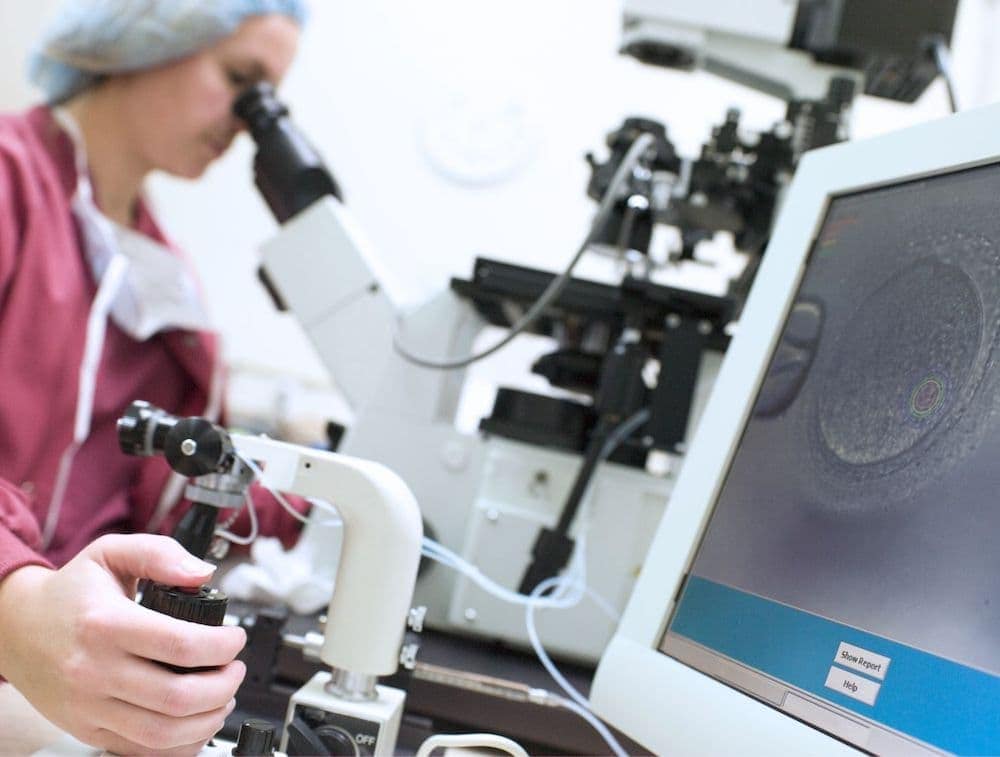
The ICSI Procedure: Step-by-Step
The ICSI procedure typically follows a specific timeline of events. First, the woman will undergo ovarian stimulation using medications to promote the development of multiple eggs. This step is essential to increase the chances of successful fertilization and pregnancy. During this time, the woman will be closely monitored through ultrasounds and blood tests to assess the growth and maturity of the eggs.
Once the eggs have reached the desired size and maturity, retrieval occurs through a minor surgical procedure called egg retrieval. This procedure is performed under sedation or anesthesia and involves the insertion of a needle into the ovaries to collect the eggs. The eggs are then placed in a culture dish and examined under a microscope.
Next, an embryologist selects a single sperm for each egg. The embryologist carefully examines the sperm under a microscope and chooses the healthiest and most viable sperm for injection. The selected sperm is immobilized using a tiny needle and injected directly into the egg.
After the injection, the eggs are monitored to ensure that fertilization occurs. The presence of two pronuclei confirms successful fertilization. The fertilized eggs, now called embryos, are cultured in the laboratory for a few days before being transferred to the woman's uterus.
Success Rates of ICSI: What to Expect
The success rates of ICSI can vary depending on several factors, including the age of the woman, the quality of the eggs and sperm, and the overall health of the couple. Generally, the success rates of ICSI are comparable to those of conventional IVF, but ICSI can improve your success rate.
Factors that may affect the success rates of ICSI include the woman's age and ovarian reserve. As women age, their ovarian reserve decreases, making achieving successful fertilization and pregnancy more difficult. However, ICSI can help overcome some of these challenges by directly injecting sperm into the egg, increasing the chances of fertilization.
A fertility specialist should discuss realistic expectations during the initial consultation. The fertility specialist can provide personalized guidance based on the individual or couple's circumstances and help manage expectations throughout treatment.
It is also important to note that success rates can vary between fertility clinics. When choosing a fertility clinic for ICSI, it is essential to consider the clinic's success rates and the qualifications and experience of the medical team. A qualified and experienced team can significantly increase the chances of a successful outcome.
After the Procedure: What to Expect
After the ICSI procedure, the woman will typically have a recovery period of a few days. During this time, she may experience discomfort or bloating as her body adjusts to the hormonal changes. A doctor can prescribe pain medication to help manage any discomfort.
A fertility specialist will schedule follow-up appointments to monitor the woman's progress and assess the procedure's success. These appointments may include ultrasounds and blood tests to check for pregnancy and monitor embryo development.
Emotional and psychological considerations are also necessary after the ICSI procedure. Infertility can affect an individual or couple's mental health, and it is crucial to seek support and counseling if needed. Many fertility clinics offer counseling services or can provide referrals to mental health professionals who specialize in infertility.
Alternative Fertility Treatments to Consider
While ICSI is a highly effective fertility treatment, it may not be the right option for every couple. There are several alternative treatments that couples struggling with infertility may consider.
One alternative treatment is intrauterine insemination (IUI), which involves placing sperm directly into the woman's uterus during ovulation. IUI can be a less invasive and less expensive option for couples with mild male factor infertility or unexplained infertility.
In some cases, a fertility specialist may suggest gestational surrogacy. Gestational surrogacy involves using a surrogate to carry the pregnancy for the couple or individual. This process can be an option for couples where the woman cannot carry a pregnancy due to medical reasons.
It is essential for couples and individuals to thoroughly discuss their options with a fertility specialist to determine the most appropriate treatment plan for their specific circumstances.
Choosing the Right Fertility Clinic for ICSI
Choosing the right fertility clinic for ICSI is crucial for a successful outcome. There are several factors to consider when making this decision.
First and foremost, choosing a fertility clinic with a qualified and experienced team is essential. The fertility specialists should have extensive ICSI experience and be board-certified in reproductive endocrinology and infertility.
The success rates of the fertility clinic should also be considered. The clinic should have a track record of high success rates, particularly in cases similar to the couple's specific circumstances.
The clinic's facilities and laboratory should also be state-of-the-art and equipped with the latest technology and equipment. These elements will ensure that the ICSI procedure is performed under optimal conditions.
During the initial consultation with the fertility clinic, asking questions and gathering as much information as possible is essential. This information can include questions about the clinic's success rates, the qualifications and experience of the medical team, and the specific steps and timeline of the ICSI procedure.
Choosing the right fertility clinic can significantly increase the chances of a successful outcome and provide couples with the support and guidance they need during this challenging time.
- Protecting Your Health: Choosing A Sperm Bank Over Natural Insemination
- Hatching a Plan: Learning The Basics About Assisted Hatching in IVF
- Navigating GYN Surgery Before Artificial Insemination
- PGT Testing and Its Role in IVF Treatment
- The Ultimate Guide To Where You Can Donate Sperm In All 50 States
Reciprocal IVF: The Revolutionary Fertility Treatment for Lesbian Couples
Reciprocal IVF, also known as shared motherhood, is a breakthrough fertility treatment that has revolutionized the options available to lesbian couples who wish to have children. This innovative procedure allows both partners to actively participate in the conception and pregnancy process, creating a unique and special bond between them and their children. Reciprocal IVF has become increasingly popular among same-sex couples, offering a solution for those who want to experience the joys of biological parenthood.
What is Reciprocal IVF and How Does it Work?
Reciprocal IVF is a fertility treatment that allows lesbian couples to contribute genetically to the conception of their child. The process involves one partner providing the eggs while the other partner carries the fertilization of the eggs and donor sperm upon pregnancy. This unique approach allows both partners to have a biological connection to their child, creating a sense of shared parenthood.
The treatment begins with the partner providing the eggs undergoing ovarian stimulation to produce more eggs. Through a surgical procedure, the eggs are retrieved and fertilized with donor sperm in a laboratory. The cultured embryos are left to fertilize for a few days before being transferred into the partner's uterus, who will be carrying the pregnancy. If successful, the embryo implants in the uterus, and pregnancy begins.
In reciprocal IVF, each partner plays a crucial role in the process. The partner providing the eggs undergoes hormonal stimulation and egg retrieval, while the partner carrying the pregnancy prepares her uterus for embryo transfer. This collaborative approach allows both partners to actively participate in the conception and pregnancy journey, fostering a deep sense of connection and involvement.
The Benefits of Reciprocal IVF for Lesbian Couples
Reciprocal IVF offers several significant benefits for lesbian couples who wish to have children. Firstly, it allows both partners to have a biological connection to their child. This process is a unique and special opportunity for same-sex couples, enabling them to share the genetic bond with their child that is often taken for granted in heterosexual relationships. This biological connection can strengthen the emotional bond between parents and children, creating a sense of belonging and identity.
Secondly, reciprocal IVF provides a shared experience of pregnancy and childbirth. While one partner may be unable to carry the pregnancy due to medical reasons or personal preference, reciprocal IVF allows them to actively participate by providing their eggs. This shared experience can deepen the emotional connection between partners and create a sense of equality and partnership in the journey to parenthood.
Lastly, reciprocal IVF offers a solution for couples with fertility issues. If one partner has fertility challenges or cannot conceive naturally, reciprocal IVF provides an alternative path to parenthood. By using the partners' eggs with healthy fertility and donor sperm, the couple can overcome these obstacles and fulfill their dream of having a child together.
The Success Rates of Reciprocal IVF Compared to Traditional IVF
When considering fertility treatments, it is essential to understand the success rates of different options. Reciprocal IVF has shown comparable success rates to traditional IVF, with studies indicating that the chances of achieving a successful pregnancy are similar between the two methods. Factors that may affect success rates include the age and fertility of the partner providing the eggs, the quality of the donor sperm, and the overall health of both partners.
It is worth noting that success rates can vary depending on individual circumstances, and couples need to consult with their fertility specialist to understand their specific chances of success. Fertility clinics often provide statistics on their success rates, which can help couples make informed decisions about their treatment options.

The Cost of Reciprocal IVF: Is it Worth the Investment?
The cost of reciprocal IVF can vary depending on many factors. These factors include the location of the fertility clinic, the specific treatments required, and any additional services or medications needed. Reciprocal IVF can cost between $20,000 and $30,000 per cycle. This cost includes the expenses associated with ovarian stimulation, egg retrieval, sperm donation, embryo transfer, and any necessary medications or tests.
Couples need to consider the financial implications of reciprocal IVF and explore their options for insurance coverage or financing. Some insurance plans may cover some of the costs, while others may not provide any coverage at all. Couples should also research financing options such as loans or payment plans offered by fertility clinics or third-party organizations.
While the cost of reciprocal IVF may seem high, you should consider the long-term benefits and value of the treatment. For many couples, the opportunity to have a biological connection to their child and experience the joys of pregnancy and childbirth outweighs the financial investment. It is a deeply personal decision that each couple must make based on their circumstances and priorities.
The Emotional Journey of Reciprocal IVF: What to Expect
The partner providing the eggs may experience feelings of anxiety or pressure related to the success of the treatment and the quality of their eggs. They may also grapple with the emotional implications of using donor sperm and the potential impact on their relationship with their child. They must have open and honest conversations with their partner and seek counseling or therapy if needed.
The partner carrying the pregnancy may also experience various emotions, including excitement, fear, and anticipation. They may have concerns about the physical toll of pregnancy and childbirth and the potential impact on their career or personal life. They need to prioritize self-care and seek support from healthcare professionals or support groups that specialize in LGBTQ+ fertility.
Both partners should prepare for setbacks or challenges along the way. Couples should be open and honest with each other, express feelings and concerns, and seek professional help if needed. The emotional journey of reciprocal IVF can be intense, but couples can navigate it successfully with the proper support and resources.
Finding the Right Fertility Clinic for Reciprocal IVF
Choosing the right fertility clinic for the reciprocal IVF process is a significant step. There are several factors to consider when researching clinics, including their success rates, experience with LGBTQ+ patients, the range of services offered, and the overall atmosphere and environment of the clinic.
It is important to choose a clinic that has a proven track record of success with reciprocal IVF and a high level of expertise in LGBTQ+ fertility. Look for clinics with experience working with same-sex couples and a supportive and inclusive approach to care. Reading patient reviews and testimonials from individuals and couples who have experienced Reciprocal IVF can also provide valuable insights into the clinic's reputation and patient satisfaction.
When researching clinics, ask specific questions about their policies and procedures. Inquire about their approach to donor sperm and eggs, legal and ethical considerations, and support services for LGBTQ+ patients. You should feel comfortable and confident in the clinic's ability to meet your unique needs and provide the highest level of care.
The Role of Sperm Donors in Reciprocal IVF
Sperm donors play a crucial role in the reciprocal IVF process. When selecting a sperm donor, couples can choose one who matches their desired characteristics, such as physical appearance, ethnicity, or educational background. Selecting a donor allows couples to create a family that reflects their values and preferences.
The process of selecting a sperm donor involves working with a sperm bank that has a database of available donors. Couples can review donor profiles, which often include information such as physical attributes, medical history, educational background, and personal interests. Some sperm banks also offer the option of meeting the donor in person or having a phone consultation.
The Impact of Reciprocal IVF on the LGBTQ+ Community
Reciprocal IVF has significantly impacted the LGBTQ+ community, providing same-sex couples a viable and accessible path to parenthood. It has helped to challenge traditional notions of family and parenting, promoting inclusivity and acceptance of diverse family structures.
Reciprocal IVF has also played a role in advancing LGBTQ+ rights and recognition. Allowing same-sex couples to have a biological connection to their child has helped to challenge discriminatory laws and policies that deny LGBTQ+ individuals the right to parent. It has also contributed to a greater understanding and acceptance of same-sex relationships and families within society.
The Future of Reciprocal IVF: Advancements and Possibilities
The field of reproductive medicine is constantly evolving, and there are exciting advancements on the horizon for reciprocal IVF. Researchers are exploring new techniques and technologies that may improve success rates, reduce costs, and enhance the overall experience for couples.
One area of advancement is using preimplantation genetic testing (PGT) to screen embryos for congenital abnormalities before transfer. PGT can enhance the chances of a healthy pregnancy and minimize the risk of genetic disorders. Additionally, advancements in cryopreservation techniques allow couples to freeze and store donor sperm and embryos for future use, providing more flexibility in family planning.
Another area of research is the development of artificial gametes, which could allow same-sex couples to create embryos using their genetic material. While this technology is still in the early stages of development, it holds promise for the future of reciprocal IVF. It could further expand the options available to same-sex couples.
- Protecting Your Health: Choosing A Sperm Bank Over Natural Insemination
- Hatching a Plan: Learning The Basics About Assisted Hatching in IVF
- Navigating GYN Surgery Before Artificial Insemination
- PGT Testing and Its Role in IVF Treatment
- The Ultimate Guide To Where You Can Donate Sperm In All 50 States
Ovulation tracking is a crucial tool for couples and individuals trying to conceive, and understanding when ovulation occurs and timing intercourse or donor insemination accordingly can significantly increase the chances of successful conception.
Although ovulation calculators can be useful, they are not completely reliable. More accurate methods of detecting ovulation, such as ovulation test kits, are available. However, using an ovulation calculator like the one provided can give you a general idea of your fertility window.
Understanding the Basics of Ovulation Tracking
Ovulation takes place during the release of a mature egg from the ovary. Once the egg is released, it then travels down the fallopian tube where it's ready for fertilization by sperm. It is a critical event in the menstrual cycle and plays a vital role in conception. The menstrual cycle is the monthly hormonal change that prepares a woman's body for pregnancy. It typically lasts about 28 days, although it can vary from woman to woman. Ovulation typically takes place around the middle of a woman's menstrual cycle, roughly 14 days before the start of the next period.
Several methods of tracking can help determine when ovulation is likely to occur. These include tracking changes in basal body temperature, monitoring cervical mucus changes, using ovulation predictor kits, and using ovulation calculators. Each method has advantages and disadvantages, and couples may choose to use one or a combination of techniques to track ovulation.
The Importance of Timing in Conception
Timing is crucial for successful conception because an egg is only viable for fertilization for a short period after it is released during ovulation. This period is known as the fertile window and typically lasts about six days, including the day of ovulation and the five days leading up to it. The timeframe for sperm survival in the female reproductive tract is up to 5 days, so having intercourse or performing insemination in the days leading up to ovulation is important to increase the chances of conception.
Several factors can affect timing in conception. As fertility declines, particularly after age 35, age is one important factor. Common fertility disorders, such as polycystic ovary syndrome (PCOS) or endometriosis, can also affect the timing and make it more difficult to conceive. Couples and individuals must be aware of these factors and consider them when tracking ovulation and trying to conceive.
How Ovulation Calculators Work
Ovulation calculators use data such as the length of a woman's menstrual cycle to predict when ovulation is likely to occur. They work by estimating the ovulation date based on the median span of a woman's menstrual cycle and assuming that ovulation occurs approximately 14 days before the start of the next period. For a more accurate prediction, some ovulation calculators consider other factors, such as basal body temperature and cervical mucus changes.
Different ovulation calculators, including online calculators, smartphone apps, and fertility-tracking devices, are available. Online calculators and smartphone apps are convenient and easy to use, but they rely on users inputting accurate data about their menstrual cycle. Fertility tracking devices, on the other hand, use advanced technology to track various fertility signs and provide more accurate predictions.
Choosing the Right Ovulation Calculator for You
When choosing an ovulation calculator, there are several factors to consider. First, consider your personal preferences and lifestyle. Do you prefer using a smartphone app or a physical device? Do you want a simple calculator or one that offers more advanced features? Consider also the accuracy of the calculator. Look for calculators that have been tested and proven accurate in predicting ovulation.
Different ovulation calculators offer various features. Some may provide additional information and resources about fertility and conception, while others may offer personalized recommendations based on your data. Consider what qualities are important to you and choose a calculator that meets your needs.
To find the best ovulation calculator for your needs, read reviews and testimonials from other users. Doing so can give you an idea of how accurate and reliable the calculator is. You can also consult your healthcare provider or a fertility specialist for recommendations.
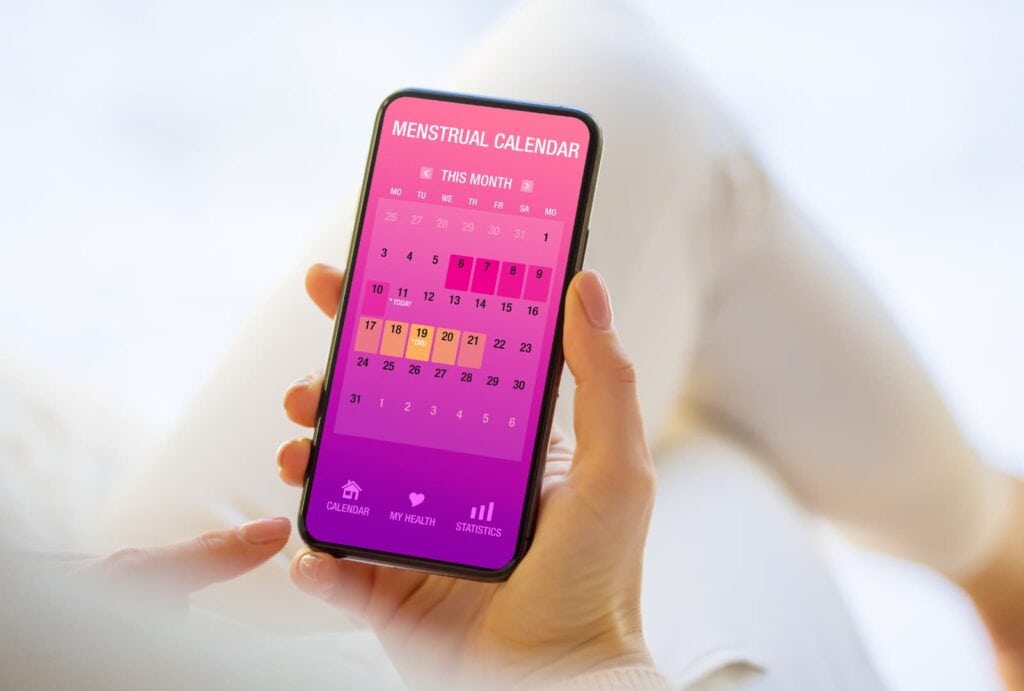
Tips for Accurate Ovulation Tracking
Accurate ovulation tracking is essential for successful conception. Here are some tips to help you track ovulation accurately:
- Use a reliable method: Choose an accurate method, such as an ovulation kit that detects increased luteinizing hormone (LH) in the urine. This type of ovulation kit is our top choice for ovulation tracking, as it provides the most accurate prediction.
- Track consistently: Track your daily menstrual cycle and fertility signs. Keeping track will help you identify patterns and predict ovulation more accurately.
- Take note of changes: Pay attention to your basal body temperature, cervical mucus, and other fertility signs. These changes can indicate when ovulation is likely to occur.
- Be aware of other factors: Consider other factors that can affect ovulation, such as stress, illness, or changes in medication. These factors can all affect the timing of ovulation.
- Seek professional help if needed: If you have difficulty tracking ovulation or have been trying to conceive for a long time without success, consider seeking professional help from a fertility specialist. They can provide guidance and support to help you achieve your goal of conception.
The Role of Hormones in Ovulation
Hormones play a crucial role in ovulation. The menstrual cycle is regulated by an intricate interplay of hormones, including FSH (follicle-stimulating hormone), LH (luteinizing hormone), estrogen, and progesterone. FSH jumpstarts the development of follicles in the ovaries containing the eggs. LH stimulates the release of the mature egg from the follicle during ovulation. Estrogen and progesterone help prepare the uterus for pregnancy and regulate the menstrual cycle.
Hormone levels can affect ovulation. Imbalances in hormone levels can disrupt the normal menstrual cycle and make conceiving challenging. Conditions such as PCOS or thyroid disorders can affect hormone levels and ovulation. Hormone-based ovulation tracking methods rely on detecting changes in hormone levels to predict ovulation. These methods include tracking changes in basal body temperature or using ovulation predictor kits.
Tracking Ovulation with Fertility Monitors
Fertility monitors are devices that track various fertility signs to predict ovulation. They use advanced technology to measure hormone levels, basal body temperature, and other fertility signs to indicate when ovulation is likely to occur accurately. Fertility monitors can be more accurate than other methods of ovulation tracking because they consider multiple factors and provide real-time data.
Using a fertility monitor involves daily testing and inputting data into the device. The monitor then analyzes the data and predicts when ovulation is likely to occur. Some fertility monitors also provide additional features such as personalized recommendations and reminders.
While fertility monitors can be more expensive than other ovulation tracking methods, they can be a worthwhile investment for couples and individuals struggling to conceive or want a more accurate ovulation prediction.
The Benefits of Ovulation Tracking for Conception
Ovulation tracking offers several benefits for couples and individuals, especially those trying to conceive through donor insemination. First and foremost, it helps identify the fertile window, the best time to have intercourse or perform insemination for successful conception. By timing intercourse or insemination during the fertile window, couples and individuals can maximize their chances of getting pregnant.
Ovulation tracking can also help identify potential fertility issues. If a woman consistently has irregular menstrual cycles or is not ovulating regularly, it may indicate an underlying fertility problem. Couples can identify these issues early by tracking ovulation and seeking professional help.
Common Mistakes to Avoid When Using Ovulation Calculators
While ovulation calculators can be a valuable tool for tracking ovulation, people must correct some common mistakes. One common mistake is relying solely on the calculator without considering other fertility signs. Ovulation calculators provide an estimate based on average cycle lengths, but every woman's cycle is unique. Tracking other indicators, such as basal body temperature and cervical mucus changes, is essential for a more accurate prediction.
Another common mistake is not inputting accurate data into the calculator. Ovulation calculators rely on accurate data about your menstrual cycle to provide accurate predictions. Ensure you input the correct length of your menstrual cycle and any other relevant information.
It is also important to remember that ovulation calculators are not foolproof and cannot guarantee a pregnancy. They are just tools to help identify the most fertile days for conception. It is still essential to have regular intercourse or perform multiple inseminations throughout the menstrual cycle to maximize the chances of getting pregnant.
When to Seek Professional Help for Fertility Issues
If you have been tracking ovulation and trying to conceive for a long time without success, it may be time to seek professional help. It is generally recommended to seek help if you have been trying to conceive through intercourse or donor insemination for a year or more without success or if you are over 35 and have been trying for six months or more.
Different types of fertility specialists can help diagnose and treat fertility issues. These include reproductive endocrinologists, gynecologists, and urologists. They can perform tests to identify underlying fertility problems and recommend appropriate treatments.
Different fertility treatments are also available, depending on the cause of infertility. These include medications to stimulate ovulation, intrauterine insemination (IUI), and in vitro fertilization (IVF). Your fertility specialist can discuss the options and help you choose the best treatment.
- Protecting Your Health: Choosing A Sperm Bank Over Natural Insemination
- Hatching a Plan: Learning The Basics About Assisted Hatching in IVF
- Navigating GYN Surgery Before Artificial Insemination
- PGT Testing and Its Role in IVF Treatment
- The Ultimate Guide To Where You Can Donate Sperm In All 50 States
At Cryobank America, we've dedicated ourselves to providing the highest quality donor sperm that is reliable and successful. We take immense pride in knowing that we play a pivotal role in helping create life and bring happiness to families across the globe.
However, our role doesn't end with providing donor sperm. We are committed to ensuring the health and well-being of our clients and their future children. That's why we urge all our clients who conceive through one of our donors to complete a Pregnancy Report. This simple yet significant step is essential to our mission to provide the best possible reproductive services.
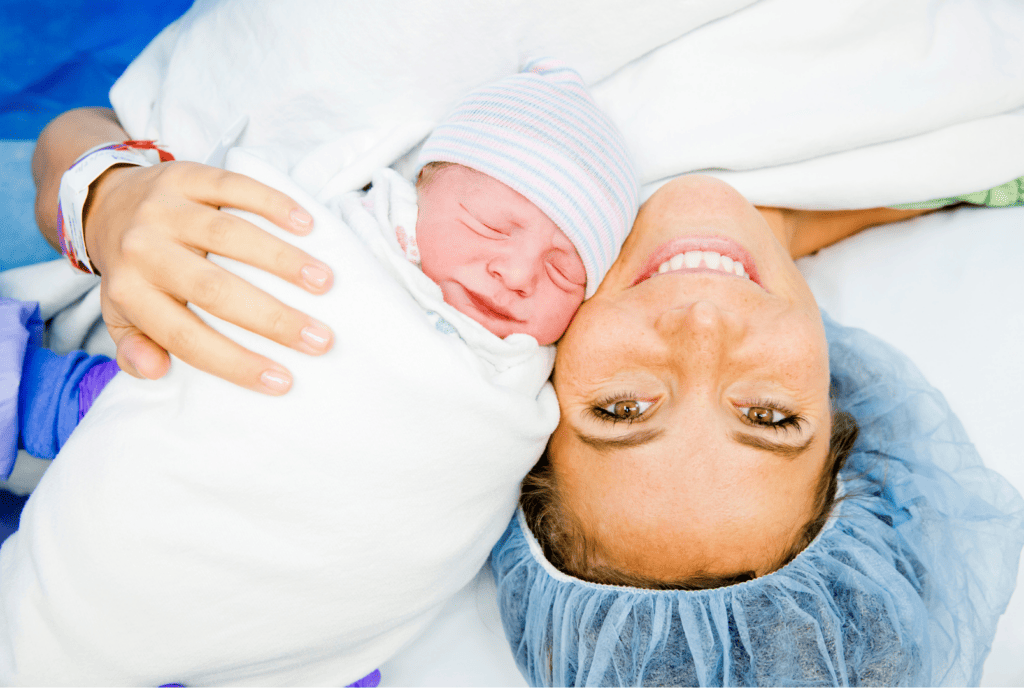
4 Key Reasons Why You Should Fill Out A Pregnancy Report
1) Our Pregnancy Report includes information that gives us valuable insight, such as the vial type, number of vials used, number of inseminations performed, insemination method, insemination setting, ovulation tracking methods, if fertility medications or hormones were needed, along with a few additional details. This information helps us determine which strategies and vial types are most successful, allowing us to extend more precise recommendations to future clients.
2) It allows us to track the success rate of our donor sperm, which helps us maintain accurate donor reports. This invaluable information enables us to continually improve donor recruitment, ensuring we provide individuals and families with the highest quality donor sperm.
3) Most importantly, filling out a Pregnancy Report lets us inform you of your donor's status change or any medical updates. As we all know, medical history plays a significant role in an individual's health. We can help you make informed decisions about your child's health by informing you about changes in your donor's medical status.
4) Privacy is paramount concerning personal matters such as conception and childbirth. Rest assured! Your Pregnancy Report remains completely confidential. At Cryobank America, we respect your privacy above all else. We never share any information you provide regarding your birth with third parties.
By filling out a Birth Report, you're not just helping us; you're helping countless other families who dream of having children. You're contributing to a larger community of people united by their desire for parenthood. You can submit your Pregnancy Report online; it only takes a few minutes! Or you can also click here to view our forms and instructions.
Have You Already Filled Out A Pregnancy Report?
Our team is eager to learn about your new bundle (or bundles) of joy! Please share your story, pictures, or videos with us at [email protected]. Having the opportunity to celebrate our client's success is one of the many reasons why we love what we do.
- Protecting Your Health: Choosing A Sperm Bank Over Natural Insemination
- Hatching a Plan: Learning The Basics About Assisted Hatching in IVF
- Navigating GYN Surgery Before Artificial Insemination
- PGT Testing and Its Role in IVF Treatment
- The Ultimate Guide To Where You Can Donate Sperm In All 50 States
Carrots are a popular vegetable that is often associated with good eyesight. However, did you know that carrots can also improve your pregnancy chances? Carrots are a superfood packed with nutrients that can boost your reproductive health. In this blog post, we will explore the power of carrots and how they can improve fertility.
How Carrots Can Boost Your Reproductive Health
Carrots are rich in beta-carotene, a type of carotenoid converted into vitamin A in the body. Vitamin A is essential for female reproductive health as it helps to regulate the menstrual cycle and promote ovulation. Carrots also contain other nutrients, such as vitamin C, folate, and potassium, which can improve the quality of your eggs and increase your chances of getting pregnant.
Vitamin A plays a crucial role in the development and maturation of eggs in the ovaries. It helps to regulate the production of hormones that control the menstrual cycle and promote ovulation. Vitamin A also supports uterine lining development, which is necessary for implantation and healthy pregnancy.
In addition to vitamin A, carrots are also rich in vitamin C, an antioxidant that protects eggs from damage caused by free radicals. Vitamin C also plays a role in the production of collagen, which is vital for the health of the cervix and the production of cervical mucus. Adequate cervical mucus levels are necessary for sperm to reach and fertilize the egg.
Furthermore, carrots are a good source of folate, a B vitamin essential for fetal development. Adequate folate levels before and during pregnancy can reduce the risk of neural tube defects and other congenital disabilities. Potassium, another nutrient in carrots, can help regulate blood pressure and maintain fluid balance, which is essential for overall reproductive health.
How Carrots Can Improve Sperm Quality
Carrots are not just beneficial for female fertility, but they can also improve male fertility. Carotenoids such as beta-carotene and lycopene can improve sperm quality by reducing oxidative stress and DNA damage. Carrots are also a good source of vitamin E, which can improve sperm motility and increase the chances of fertilization.
Oxidative stress occurs when there is an imbalance between the production of free radicals and the body's ability to neutralize them with antioxidants. This imbalance can lead to damaged cells, including sperm cells. Carotenoids like beta-carotene and lycopene are powerful antioxidants that neutralize free radicals and protect sperm from damage.
In addition to their antioxidant properties, carotenoids can also improve sperm motility. Motility refers to the ability of sperm to move and swim toward the egg. Carrots contain Vitamin E, which can improve sperm motility by protecting the cell membranes of sperm cells from damage.
Carrots and Ovulation: How They Can Help You Conceive
Ovulation is a crucial step in conception; carrots can help promote ovulation. The beta-carotene in carrots can regulate the menstrual cycle and stimulate the release of an egg from the ovary. Carrots can also improve the quality of cervical mucus, essential for sperm to reach the egg.
Beta-carotene converts into vitamin A in the body, which regulates the production of hormones that control the menstrual cycle. By promoting hormonal balance, carrots can help to regulate ovulation and increase the chances of conceiving.
Furthermore, carrots can improve the quality of cervical mucus, which is necessary for sperm to swim through the cervix and reach the egg. Adequate cervical mucus levels are important for sperm survival and fertilizing the egg. Carrots can help to improve the quality and quantity of cervical mucus, making it easier for sperm to reach the egg.
The Nutritional Value of Carrots: Why They Are a Superfood for Fertility
Carrots are a superfood for fertility, packed with essential nutrients for reproductive health. Carrots are a good vitamin A, C, folate, potassium, and fiber source. These nutrients can improve the quality of eggs and sperm, regulate the menstrual cycle, and reduce the risk of congenital disabilities.
Vitamin A is essential for reproductive health as it regulates the menstrual cycle, promotes ovulation, and supports the development of the uterine lining. Vitamin C is an antioxidant that can protect eggs from damage and support cervical mucus production. Folate is essential for fetal growth and can reduce the risk of congenital disabilities. Potassium helps regulate blood pressure and maintain fluid balance, vital for overall reproductive health. Fiber is important for maintaining a healthy weight and improving fertility.

How Carrots Can Regulate Your Menstrual Cycle
Hormonal imbalances can affect fertility, and carrots can help regulate the menstrual cycle. Carrots contain phytoestrogens, which are plant compounds that can mimic the effects of estrogen in the body. Phytoestrogens can help balance hormones and regulate the menstrual cycle.
Phytoestrogens are naturally occurring compounds found in certain plants that have a similar structure to estrogen, the primary female sex hormone. These compounds can mimic or modulate the effects of estrogen in the body, helping to regulate hormonal balance. Unlike synthetic hormones, phytoestrogens are derived from plants and are considered a more natural solution for hormonal imbalances.
Carrots and Antioxidants: How They Can Protect Your Eggs and Sperm from Damage
Oxidative stress can damage eggs and sperm, which can reduce fertility. Carrots are rich in antioxidants such as beta-carotene, vitamin C, and vitamin E, which can protect eggs and sperm from damage. Antioxidants can also improve the quality of eggs and sperm, increasing the chances of fertilization.
Antioxidants are compounds that can neutralize free radicals, which are unstable molecules that can cause damage to cells. By consuming foods rich in antioxidants, such as carrots, you can protect your eggs and sperm from damage caused by oxidative stress.
How Carrots and Vitamin A Can Improve Your Chances of Getting Pregnant
Vitamin A plays a crucial role in regulating the production of hormones that control the menstrual cycle and promote ovulation. By promoting hormonal balance, vitamin A can increase the chances of conceiving.
Furthermore, vitamin A is essential for developing and maturing eggs in the ovaries. It can improve the quality of eggs and increase the chances of fertilization. Adequate vitamin A levels before and during pregnancy can reduce the risk of congenital disabilities.
Incorporating Carrots into Your Diet
Incorporating carrots into your diet is easy and delicious. You can add carrots to salads, soups, stews, and stir-fries. You can roast, steam, or even eat carrots raw as a snack. The best part is that you only need to consume ONE carrot daily to receive all the benefits mentioned in this article.
Carrots are a superfood that can improve your chances of getting pregnant and promote overall health. Carrots are rich in nutrients such as beta-carotene, vitamin A, vitamin C, folate, and potassium, which can boost reproductive health. Carrots can also regulate the menstrual cycle, improve sperm quality, and protect eggs and sperm from damage. Incorporating carrots into your diet is easy and delicious, so add this superfood to your meals today.
- Protecting Your Health: Choosing A Sperm Bank Over Natural Insemination
- Hatching a Plan: Learning The Basics About Assisted Hatching in IVF
- Navigating GYN Surgery Before Artificial Insemination
- PGT Testing and Its Role in IVF Treatment
- The Ultimate Guide To Where You Can Donate Sperm In All 50 States
Freezing and Storing Sperm
Sperm freezing is a way for men to save their fertility by freezing and storing their sperm for later use. This technique has become increasingly popular as more individuals recognize the importance of maintaining their reproductive options.
It involves collecting a sperm sample from the individual and subjecting it to a series of steps that prepare it for freezing. A cryobank can store frozen sperm for many years. This storage option allows people to preserve their ability to have children. It benefits those who do not want to start a family immediately.
The history of sperm storage dates back to the 1950s when researchers began experimenting with freezing sperm. Over the years, advancements in technology and techniques have made the process more efficient and successful. Today, sperm storage is a widely accepted method for preserving fertility. Individuals who must undergo cancer treatments or individuals with medical conditions that may affect their fertility also use this method.
The Process of Freezing Sperm
The process of freezing sperm involves several steps to ensure the usability and longevity of the sperm. Once the sample is collected through masturbation, the quality and quantity of the sperm is analyzed.
After the collection and analysis, a cryoprotectant solution is added to the sample. This solution helps protect the sperm from damage during the freezing process. The mixture is divided into small vials or straws labeled and sealed for freezing.
The freezing process typically involves slowly lowering the temperature of the sperm sample to -196 degrees Celsius using liquid nitrogen. This rapid freezing technique is called vitrification.
Vitrification: Rapid Freezing Process
The process of vitrification involves several steps. First, the cells or tissues are treated with a cryoprotectant solution to dehydrate and protect them from freezing damage. Next, they are rapidly cooled to very low temperatures using liquid nitrogen or another cryogenic agent. The rapid cooling prevents the formation of ice crystals and instead forms a glass-like solid.
During vitrification, it is crucial to minimize the exposure of cells or tissues to toxic levels of cryoprotectants. A stepwise approach, where the concentration of cryoprotectants is gradually increased before vitrification, can avoid these harmful levels.
Vitrified samples stored at ultra-low temperatures remain without significant degradation. They can be rapidly thawed and rehydrated for transplantation or research purposes.
Various applications utilize vitrification. Some of these applications include the storage of embryos for in vitro fertilization (IVF), cord blood stem cells, and biological samples for research.
Benefits of Sperm Storage
Sperm storage offers several benefits to individuals who wish to preserve their fertility. One of the primary benefits is the ability to maintain reproductive options in the future. By freezing their sperm, individuals can ensure they have viable sperm available when they are ready to start a family.
Another benefit of sperm storage is the convenience and flexibility it provides. Individuals can freeze their sperm anytime, allowing them to plan for their future without the pressure of starting a family immediately. Storing sperm can benefit individuals pursuing education, career advancement, or other personal goals before beginning a family.
Additionally, sperm storage can reduce the risk of genetic abnormalities in offspring. Freezing sperm at a younger age is very beneficial. It allows individuals to preserve their sperm when it is healthier and less likely to have congenital abnormalities. Storing fertility can be vital for individuals with genetic conditions or a family history of genetic disorders.
Who Can Benefit from Sperm Storage?
Sperm storage can benefit many individuals at risk of fertility loss. It's a smart choice for those who wish to preserve their reproductive options. Some of the groups that can benefit from sperm storage include:
- Certain medical conditions, such as testicular cancer, leukemia, or autoimmune diseases, can affect sperm production or quality. By freezing their sperm before treatment, these individuals can preserve their fertility and increase their chances of having biological children.
- Men undergoing cancer treatment: Chemotherapy and radiation therapy can harm sperm production and quality. Sperm storage before cancer treatment can allow men to have biological children after completing their treatment.
- Men in high-risk occupations exposed to hazardous environments or substances may be at risk of fertility loss. By freezing their sperm, these individuals can protect their fertility and have the option to start a family.
- Men with low sperm counts or poor sperm quality may have difficulty conceiving naturally. By freezing their sperm, they can increase their chances of successful fertilization through assisted reproductive techniques.
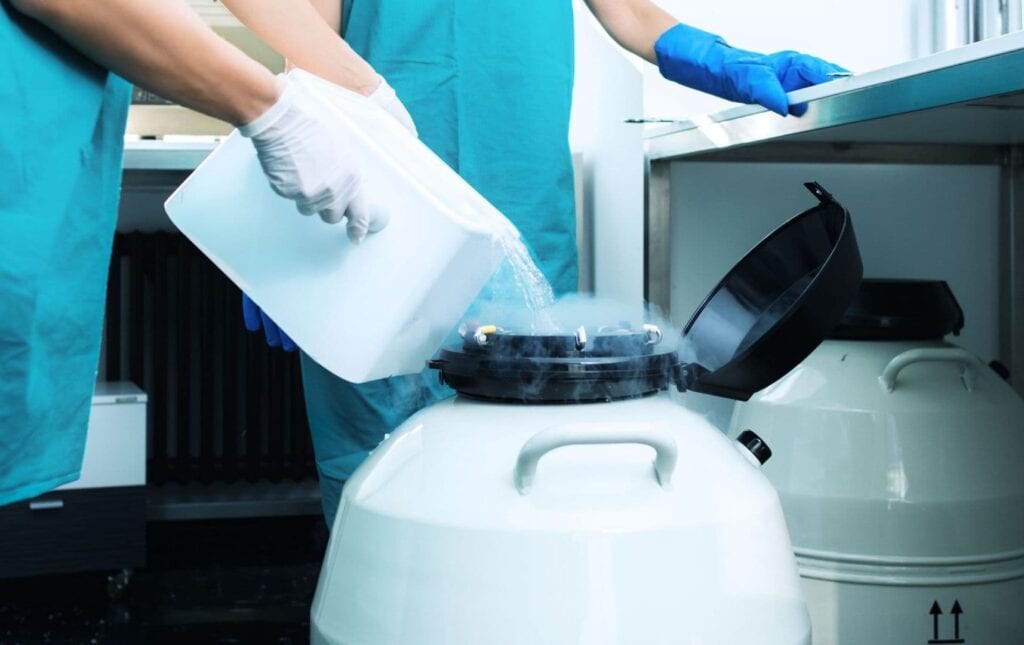
Longevity of Frozen Sperm
The longevity of frozen sperm depends on several factors. Storage conditions and the quality of the sperm at the time of freezing are two primary factors. Generally, cryobanks can store frozen sperm for many years without significant loss of viability.
The recommended storage duration for frozen sperm varies depending on the country and the specific regulations in place. In some countries, cryobanks can store frozen sperm for up to 10 years. In other countries, cryobanks can store sperm indefinitely.
Studies have shown that using long-term frozen sperm for assisted reproductive techniques can yield successful outcomes. The success rates of using frozen sperm to achieve pregnancy are comparable to those of using fresh sperm. These rates indicate that frozen sperm can remain viable and capable of fertilization even after many years of storage.
Success Rates of Sperm Storage
The success of sperm storage depends on various factors. Sperm quality, the freezing technique used, and the laboratory's performing procedure expertise are a few factors to consider. Overall, the success rates of using frozen sperm for conception are encouraging.
Studies have shown that the survival rate of frozen sperm after thawing is typically high, ranging from 50% to 80%. Once frozen sperm is thawed, a significant portion remains viable and capable of fertilization.
The success rates of using frozen sperm for assisted reproductive techniques, such as IVF or IUI, are also promising. The chances of achieving pregnancy using frozen sperm are comparable to using fresh sperm. Frozen sperm can be just as effective in achieving conception.
Alternatives to Sperm Storage
Alternative sperm storage options are good for individuals who may not be suitable candidates for this procedure. Some of the alternatives to sperm storage include:
- Testicular Tissue Freezing may be an option for Individuals who cannot produce motile sperm. It could also benefit those at risk of losing their fertility due to medical reasons. Testicular tissue freezing involves removing a small piece of testicular tissue and freezing it for future use.
- Donor sperm is an excellent option for anyone experiencing fertility issues or same-sex couples wanting to start a family. Sperm banks have a collection of donors to choose from. The best part is they're all carefully screened and selected based on the sperm bank's standards. Donor sperm is used in home insemination, intrauterine insemination (IUI), intracervical insemination (ICI), intracytoplasmic sperm injection (ICSI), or in-vitro fertilization (IVF) procedures.
- Adoption can be an excellent option for starting a family. Individuals who cannot conceive naturally or prefer not to pursue assisted reproductive techniques can explore this. Adoption allows individuals to provide a loving home to a child in need.
Individuals must discuss their options with a fertility specialist to determine the most suitable method for preserving their fertility.
The Cost of Sperm Storage
The cost of sperm storage can vary depending on several factors. The cryobank's location, services included, and any additional procedures or tests required to determine the final cost. Sperm storage can range from $500 to $1,500, excluding extra storage or future use fees.
Cryobank America stores sperm for a one-time collection fee of $225 and a monthly storage fee of $18.99. You'll pay a one-time withdrawal fee of $399 when you are ready to use your sample.
Most insurance companies don't cover sperm storage. However, some insurance plans may cover individuals with medical conditions that affect their fertility, such as cancer. Cryobank America has partnered with LIVESTRONG Fertility, offering discounted storage services for registered patients.
Frozen Sperm For Future Fertility
Sperm storage is a valuable option for individuals who wish to preserve their fertility for future use. By freezing and storing their sperm, individuals can maintain their reproductive choices and increase their chances of having future biological children. The process of sperm storage is safe and effective, with high success rates for achieving pregnancy using frozen sperm.
- Protecting Your Health: Choosing A Sperm Bank Over Natural Insemination
- Hatching a Plan: Learning The Basics About Assisted Hatching in IVF
- Navigating GYN Surgery Before Artificial Insemination
- PGT Testing and Its Role in IVF Treatment
- The Ultimate Guide To Where You Can Donate Sperm In All 50 States

